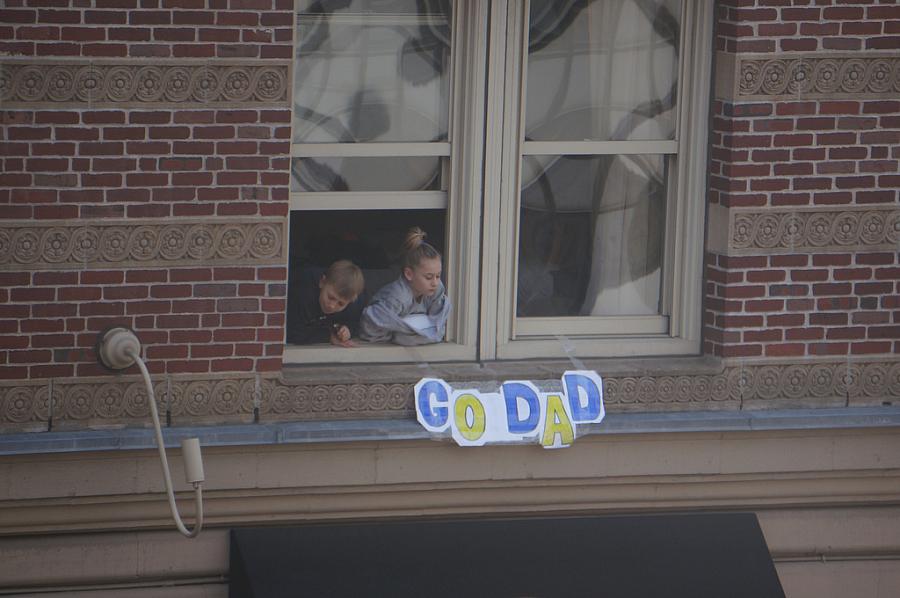Psychologists: What to Expect After the Boston Marathon Bombings

Two children look on above the Boston Marathon route.
It’s far too soon to characterize the exact nature of the wound the Boston Marathon bombings will leave on the nation’s collective psyche. The questions still vastly outnumber the answers and likely will for some time.
But perhaps one way in which health reporters can be useful right now is to seek some guidance from mental health experts on coping with trauma and what to look out for, whether dealing with our own gut-level sadness or trying to make explain the inexplicable to children.
What types of suggestions are media outlets offering so far?
Much of the advice has centered on how to talk to kids about Monday’s bombings. ABC News turned to clinical child psychologist Jaime Howard, who says parents shouldn’t avoid discussing what happened in Boston with their children.
“Kids are getting information really quick these days, so it might not be that another 5-year-old is seeing it on the Internet, but then the older kids at school are talking about it,” Howard said.
Howard has some tips for parents when dealing with their children. Try to be calm and direct when you talk with your child, even you’re a little afraid yourself. Also, sadness, anxiety and even nightmares are normal in children after a national tragedy.
Clinical psychologist Dr. Patricia Saunders told CBS New York parents should ask their kids what they know and how they’re feeling about it, but do so in kid-friendly language:
“Something really bad and scary happened today, and what do you know about it?”
You want to find out what your child’s experience of it was. Kids often distort what they saw and what they heard. “You want to correct the reality for them, but it should be in kid language and in kid-sized bites,” Dr. Saunders said. “And turn off the television.”
Turning off the television doesn’t just apply to kids either. For those absorbed by the nonstop news cycle, stepping away can give the mind much-needed relief. Here’s Dr. Marc Siegel, associate professor of medicine at NYU Langone Medical Center, writing for FoxNews.com:
It is normal to feel vulnerable and to worry after an event like this, but if you find yourself obsessing on the news and it is interfering with your sleep and making you feel helpless, then it is time to pull back, watch less TV, and divert your attention elsewhere. And remember, if you want your children to be calm, then be calm yourself.
The less we obsess on the events in Boston on Monday, the less we panic, the better for our collective health.
Those directly impacted by Monday’s bombings, either as witnesses, rescuers or victims, don’t have that luxury of unplugging from the trauma.
Victims wounded by the blasts will face a long road to recovery, including coming to terms with the mental trauma of their injuries and experience. The Guardian quotes Dr. Stephen Wegener, a psychologist and limb-loss expert at Johns Hopkins University School of Medicine, who provides some very specific estimates on PTSD rates following amputations:
“People are very different in how they respond,” he said. “We know that over the long term, about 30% of people who have an amputation will experience depression. If the amputation is associated with trauma – as in the case in Boston – those people have a risk of post-traumatic stress disorder (PTSD), around a third of people suffer PTSD. But the majority of amputees do not suffer PTSD. People are remarkably resilient.”
Wegener said amputees also face body-image challenges, as well as adapting to changes in personal relationships and working life.
Finally, what about all the Bostonians who may not have been at the marathon’s finish line but nonetheless witnessed their city ruthlessly attacked Monday?
Eric Jaffe, writing for The Atlantic Cities, points to a study undertaken in the wake of 9/11 that found about two-thirds of New York City residents met the study’s criteria for “resilience.” Jaffe writes:
In the six months following 9/11, a group of behavioral researchers surveyed the psychological response of nearly 3,000 residents from across metropolitan New York. The calls were a random representation of the city: from people who'd been exposed directly to the attacks to those who simply had a 212 area code …
What they found, far more than previous trauma theories suggested they would, was the great prevalence of resilience. The researchers established a very conservative definition of resilience, applying it only to people who showed zero or one PTSD symptom — some of which, like sleep trouble, can exist even in the absence of any major event. Despite that strict measure, about 65 percent of the New York-area residents contacted for the study qualified as resilient within a half-year of the attacks.
While we can no doubt debate how encouraging that 65 percent figure is, the emphasis on the human capacity to withstand and recover from horrific events is perhaps appropriate today, just one day after three people loss their lives, 176 were injured and a nation was yet again besieged by darkness.
Photo by hahatango via Flickr

